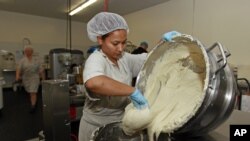A molecule found in healthy people may help those with celiac disease. The newly identified molecule, a protein called elafin, tames an enzyme that plays a role in inflammation of the small bowel caused by eating certain grains.
An estimated one in 100 people suffers from celiac disease. It is marked by inflammation in the small intestine triggered when they eat a hard-to-digest protein called gluten, which is found in wheat, barley and rye and most cereals. The autoimmune disorder causes abdominal pain, bloating, malnutrition and anemia, and increases the risk of cancer.
Millions more individuals are gluten sensitive. That is, they test negative for celiac disease but their digestive enzymes cannot break down gluten, and that triggers bouts of abdominal cramps, pain and diarrhea.
Constant exposure to gluten causes the lining of the intestine to become thin. The only treatment for celiac disease is extremely difficult, it's life-long avoidance of bread, pasta and foods containing gluten so the bowel can heal.
But there may soon be a way to eliminate the gastrointestinal distress.
Research scientist Elena Verdu of McMaster University in Ontario, Canada, says experts already knew that patients with another digestive disorder called inflammatory bowel disease have abnormally low levels of the protein elafin.
“And therefore we set to examine the levels of elafin in biopsies from patients with celiac disease and in patients that were one year on a gluten-free diet and also in patients without celiac disease. And we discovered that patients with celiac disease had decreased levels of elafin in the upper gut," said Verdu.
In healthy individuals, elafin interacts with an enzyme called transglutaminase 2, preventing the inflammatory reaction experienced by celiac and gluten sensitive people.
McMaster researchers, in collaboration with scientists at Mayo Clinic in Minnesota, did experiments with non-celiac, gluten sensitive mice. As described in The American Journal of Gastroenterology, they gave the rodents a helpful food bacterium called Lactococcus lactis, genetically engineered to produce elafin in the gut.
“So when these mice were given the Lactococcus lactis with the elafin and they were challenged with gluten, they did not develop these abnormalities. So, they did not have the leaky barrier [gut], they did not have the inflammation, they did not have any of these alternations. They were as the normal mice that were not given gluten," said Verdu.
Vendu says an elafin-containing probiotic could add flexibility to a gluten-free diet, but to be protective, it would have to be taken as a dietary supplement before each meal.
An estimated one in 100 people suffers from celiac disease. It is marked by inflammation in the small intestine triggered when they eat a hard-to-digest protein called gluten, which is found in wheat, barley and rye and most cereals. The autoimmune disorder causes abdominal pain, bloating, malnutrition and anemia, and increases the risk of cancer.
Millions more individuals are gluten sensitive. That is, they test negative for celiac disease but their digestive enzymes cannot break down gluten, and that triggers bouts of abdominal cramps, pain and diarrhea.
Constant exposure to gluten causes the lining of the intestine to become thin. The only treatment for celiac disease is extremely difficult, it's life-long avoidance of bread, pasta and foods containing gluten so the bowel can heal.
But there may soon be a way to eliminate the gastrointestinal distress.
Research scientist Elena Verdu of McMaster University in Ontario, Canada, says experts already knew that patients with another digestive disorder called inflammatory bowel disease have abnormally low levels of the protein elafin.
“And therefore we set to examine the levels of elafin in biopsies from patients with celiac disease and in patients that were one year on a gluten-free diet and also in patients without celiac disease. And we discovered that patients with celiac disease had decreased levels of elafin in the upper gut," said Verdu.
In healthy individuals, elafin interacts with an enzyme called transglutaminase 2, preventing the inflammatory reaction experienced by celiac and gluten sensitive people.
McMaster researchers, in collaboration with scientists at Mayo Clinic in Minnesota, did experiments with non-celiac, gluten sensitive mice. As described in The American Journal of Gastroenterology, they gave the rodents a helpful food bacterium called Lactococcus lactis, genetically engineered to produce elafin in the gut.
“So when these mice were given the Lactococcus lactis with the elafin and they were challenged with gluten, they did not develop these abnormalities. So, they did not have the leaky barrier [gut], they did not have the inflammation, they did not have any of these alternations. They were as the normal mice that were not given gluten," said Verdu.
Vendu says an elafin-containing probiotic could add flexibility to a gluten-free diet, but to be protective, it would have to be taken as a dietary supplement before each meal.




